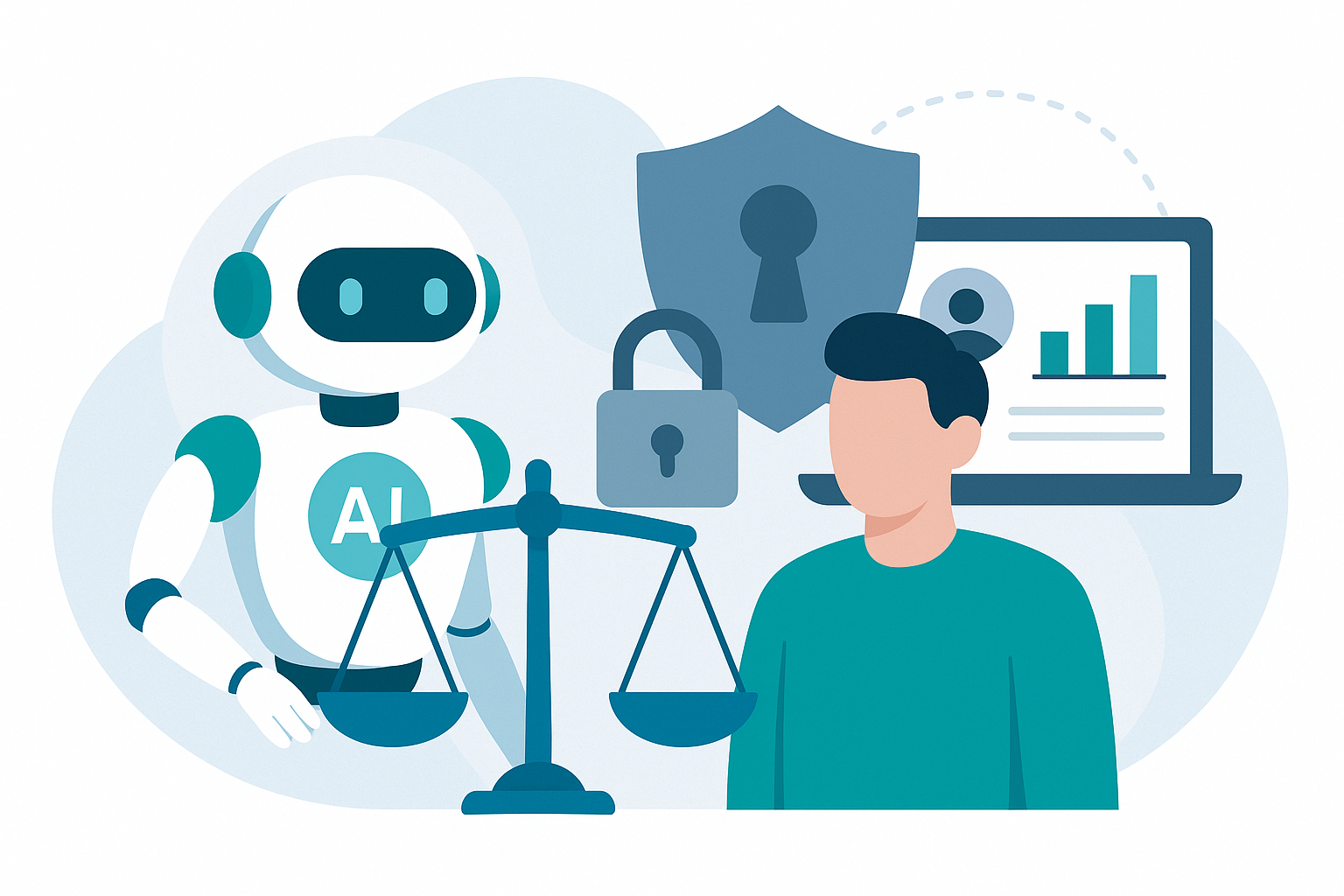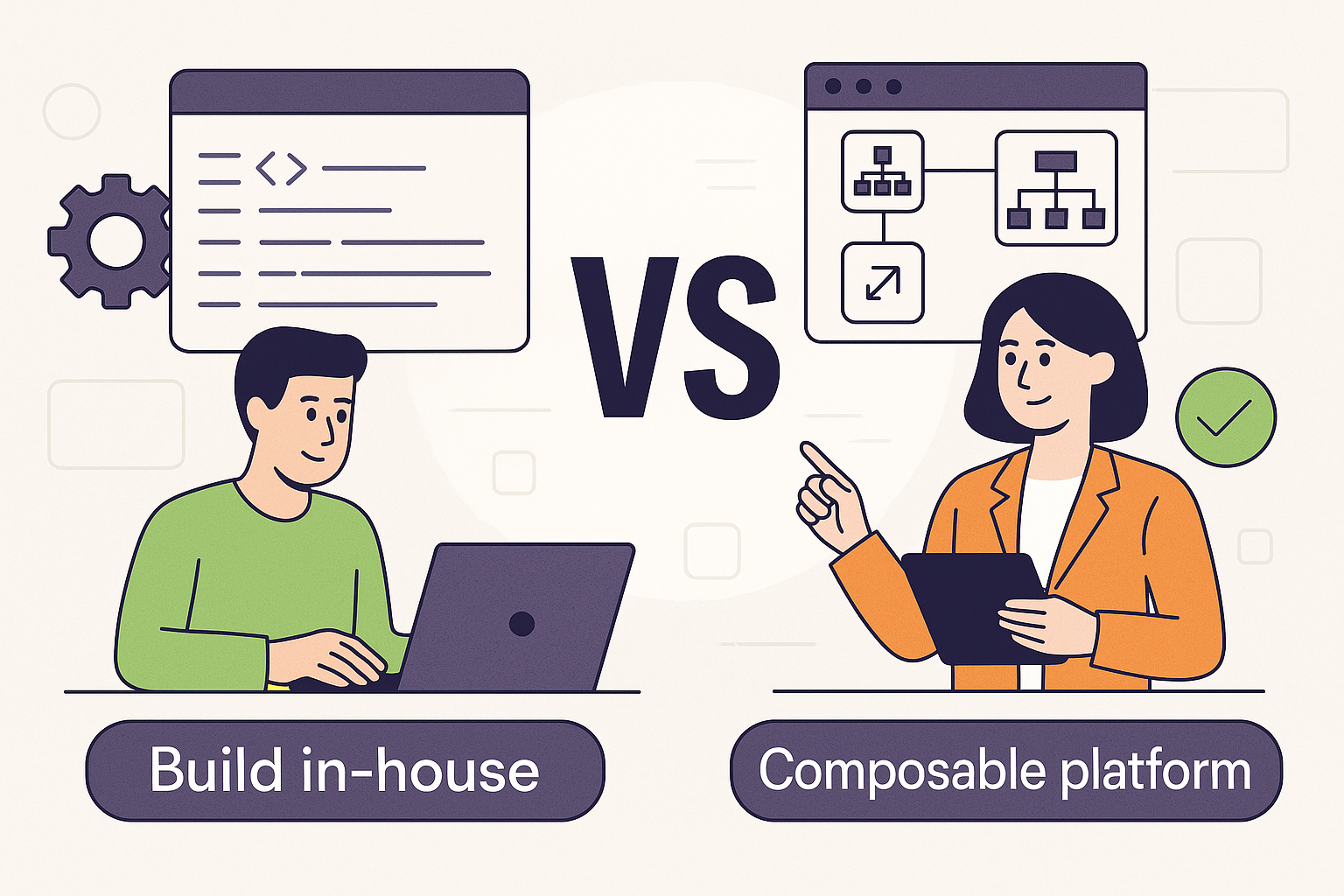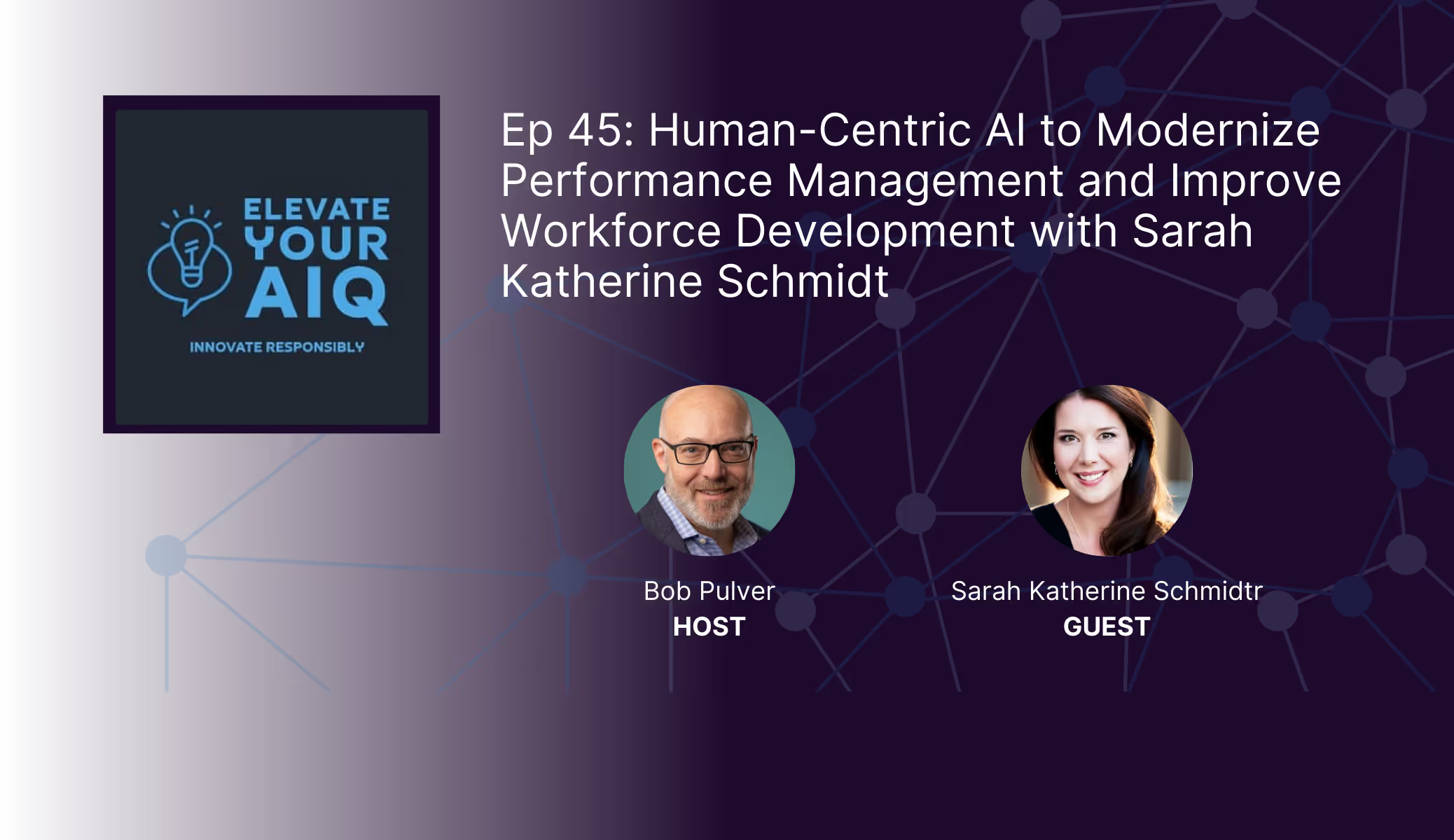In today's rapidly evolving HR technology landscape, autonomous AI agents offer tremendous potential to transform workforce management. However, substantial influence necessitates significant accountability. As organizations increasingly deploy AI systems that can access, analyze, and act upon sensitive employee data, ethical considerations must be at the forefront of implementation strategies.
What is an Autonomous AI Agent?
An autonomous AI agent is an artificial intelligence system designed to operate independently with minimal human supervision. These agents can perceive their environment, make decisions based on available data, and take actions to achieve specific objectives – all with varying degrees of autonomy.
Key Characteristics of Autonomous HR Agents
- Self-direction: Ability to perform tasks and make decisions without continuous human oversight
- Adaptability: Capacity to learn from interactions and improve performance over time
- Goal-oriented: Focused on achieving specific HR objectives like screening candidates or answering employee queries
- Context-awareness: Understanding of organizational policies, employee needs, and situational nuances
- Multi-functional: Capability to handle various HR processes from recruitment to employee engagement
Spectrum of Autonomy
AI agents in HR exist on a spectrum of autonomy, ranging from basic rule-following systems to highly sophisticated decision-makers:
- Level 1: Simple automation with predefined workflows (e.g., sending scheduled reminders)
- Level 2: Basic adaptive responses based on limited parameters (e.g., chatbots with predefined answers)
- Level 3: Context-aware decision-making within constraints (e.g., resume screening with learned preferences)
- Level 4: Advanced autonomous operation with human oversight for critical decisions (e.g., personalized learning recommendation systems)
- Level 5: Highly autonomous strategic advisors that can suggest policy changes and predict workforce trends
The most effective HR implementations typically balance autonomy with appropriate human oversight, particularly for decisions that significantly impact employees' careers and wellbeing.
The Promise and Peril of Autonomous HR Agents
Autonomous HR agents can streamline recruitment, optimize onboarding, personalize learning experiences, and provide predictive insights about employee performance and retention. These capabilities can save time, reduce costs, and enable HR teams to focus on strategic initiatives rather than administrative tasks.
However, these same systems present significant ethical challenges. Without proper design and oversight, AI agents might perpetuate existing biases in hiring and promotion decisions, compromise employee privacy through excessive data collection, and create "black box" decision-making processes that lack transparency. These technical shortcomings can undermine the very purpose of HR systems that are meant to support fair and equitable workplace practices.
Furthermore, poorly implemented AI systems risk reducing human agency in sensitive HR matters and eroding trust between employees and management. When employees feel they are subject to algorithmic management without recourse or explanation, workplace morale and organizational culture can suffer significantly. This emphasizes why ethical considerations must be integrated into AI development from the earliest design phases rather than added as afterthoughts once problems emerge.
Real-World Examples of Ethical HR AI
Several organizations have demonstrated leadership in ethical AI implementation:
- IBM's AI Ethics Board reviews all HR AI applications for potential bias before deployment
- Microsoft's "AI, Ethics, and Effects in Engineering and Research" committee establishes guidelines for responsible AI development
- Unilever's transparent AI recruitment process explains to candidates exactly how algorithms are used in hiring
Core Ethical Principles for HR AI Implementation
The companies above are part of a growing number of organizations that are investing in processes and programs that drive deeper trust in AI and the ways it is being used in decision making. Implementing AI in HR demands a foundation of ethical principles to ensure these powerful technologies enhance rather than compromise workplace fairness and dignity. These core principles serve as guardrails that guide organizations in deploying autonomous agents that respect employee rights while delivering business value.
1. Privacy by Design
Responsible autonomous agents must operate with privacy as a foundational principle rather than an afterthought. In the context of HR systems, this means creating a comprehensive privacy framework that governs all aspects of employee data handling. When designing these systems, organizations should collect only the employee data necessary for specific, clearly defined purposes, implementing a minimalist approach that respects individual privacy while still enabling effective functionality. This mindset must be accompanied by robust data security measures and access controls that protect sensitive information from both external threats and inappropriate internal access.
Furthermore, ethical AI implementation requires establishing clear data retention policies and deletion protocols that prevent the indefinite storage of employee information once it has served its purpose. Perhaps most importantly, organizations must provide employees with complete transparency about what data is being collected and how it's being used by autonomous systems. This transparency builds trust and gives employees agency in their relationship with workplace AI. When privacy considerations are embedded in every aspect of system architecture and organizational culture, autonomous HR agents can deliver value while preserving human dignity and respecting personal boundaries.
2. Fairness and Bias Mitigation
AI systems can unintentionally perpetuate or amplify existing biases in the workplace, creating unfair outcomes that disproportionately impact marginalized groups. These biases often stem from historical inequities embedded in training data, reflecting past discriminatory practices in hiring, promotion, and performance evaluation. When autonomous agents learn from this biased data, they risk systematizing discrimination at scale, potentially creating more pervasive and persistent inequities than manual processes.
Responsible implementation requires a multi-faceted approach to bias mitigation. Organizations must ensure training data is diverse and representative of the full spectrum of employees they wish to serve. Regular auditing of AI decisions should be conducted to identify potential bias patterns, complemented by intersectional testing that examines outcomes across various demographic dimensions simultaneously. Finally, continuous monitoring and refinement of algorithms is essential, as bias can emerge in unexpected ways as systems evolve and organizational contexts change. This ongoing vigilance transforms bias mitigation from a one-time fix into a sustained commitment to fairness.
3. Transparency and Explainability
Transparency in AI systems should be a fundamental right for employees whose professional lives are increasingly influenced by these technologies. Organizations must proactively communicate where and how AI is being integrated into HR processes, from recruitment to performance evaluation. This transparency should extend to explaining the underlying mechanisms of these systems through explainable AI techniques that make algorithmic decision-making comprehensible to all stakeholders. When employees understand the factors influencing AI-generated recommendations or decisions about their careers, they develop greater trust in these systems and the organization as a whole.
Beyond transparency, ethical AI implementation requires appropriate safeguards to protect employee interests. Human oversight must be maintained for consequential decisions that significantly impact career trajectories or workplace experiences, ensuring that technology augments rather than replaces human judgment in sensitive areas. Additionally, organizations should establish clear mechanisms for employees to challenge or appeal AI-generated decisions they believe to be inaccurate or unfair. These accountability structures not only protect individual rights but also provide valuable feedback loops for improving system performance and addressing potential biases or limitations in autonomous agents.
4. Human-Centered Design
At the heart of effective AI integration in HR lies the principle of human-centered design, where autonomous agents serve as powerful enablers rather than replacements for human judgment. A thoughtful division of responsibilities ensures that AI handles repetitive, data-intensive tasks while human professionals focus on complex decision-making that requires empathy, ethical consideration, and contextual understanding. This balanced approach maintains the essential "human touch" in sensitive employee interactions such as delivering difficult feedback, addressing personal concerns, or navigating complex interpersonal dynamics—areas where human intuition and emotional intelligence remain irreplaceable.
Furthermore, responsible AI implementation prioritizes employee agency by designing systems that expand rather than restrict human capabilities and choices. These systems should position employees as empowered partners in the process, not passive subjects of algorithmic management. Critical to this approach is the establishment of robust feedback loops between AI systems and their human users, allowing continuous refinement based on real-world experiences and outcomes. When employees can provide input that shapes how autonomous agents operate, the technology becomes more responsive to human needs, more aligned with organizational values, and ultimately more effective at supporting a positive workplace culture.
Best Practices for Implementation
Organizations seeking to deploy autonomous HR agents responsibly should consider these best practices:
1. Establish an AI Ethics Committee
Create a cross-functional team including HR, legal, IT, and employee representatives to develop ethical guidelines and review AI implementations.
2. Conduct Regular Algorithmic Impact Assessments
Before deploying any autonomous HR agent, assess its potential impacts on different stakeholder groups, with particular attention to historically marginalized populations.
3. Implement Robust Governance Frameworks
Develop clear policies regarding data usage, model training, testing requirements, and ongoing monitoring of AI systems.
4. Prioritize Employee Education
Ensure employees understand how AI is being used in HR processes, what data is collected, and how decisions are made.
5. Create Meaningful Consent Mechanisms
Give employees agency regarding their data and how it's used, with options to opt out of certain AI-driven processes when appropriate.
6. Partner with Responsible Vendors
Working with the right technology partners is crucial for implementing ethical AI systems. Responsible vendors should provide transparency about how their AI works and commit to ongoing ethical improvement.
Ethics as Competitive Advantage
Far from being merely a compliance requirement, ethical AI implementation represents a strategic advantage in the HR domain. When organizations prioritize responsible deployment of autonomous HR agents, they create a foundation of trust that naturally enhances employee engagement and satisfaction. This trust stems from knowing that AI systems are designed to be fair, transparent, and respectful of privacy concerns. Simultaneously, organizations benefit from improved decision-making processes as bias mitigation techniques lead to more equitable outcomes across diverse employee populations.
The business benefits extend beyond the immediate workplace environment. Organizations implementing ethical AI practices typically experience significant improvements in talent acquisition and retention, as candidates and employees alike are drawn to companies demonstrating responsible technology use. These organizations also face substantially reduced legal and reputational risks by proactively addressing compliance issues before they become problems. Perhaps most importantly, ethical implementation creates the conditions for sustainable long-term AI adoption, as systems designed with human-centered principles tend to garner broader acceptance and deliver more lasting value to both the organization and its workforce.
As we navigate the exciting frontier of agentic AI in HR, let's ensure that our technological capabilities are matched by our ethical commitments. By designing autonomous systems that respect privacy, promote fairness, maintain transparency, and center human needs, we can harness the power of AI to create more effective, equitable, and humane workplaces.
%20(1).svg)







